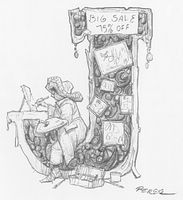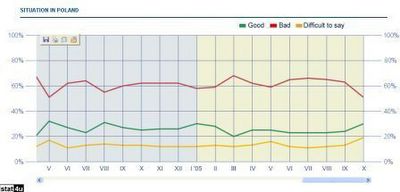Jaded for Free: Lies, Damned Lies, and Public Opinion Polls
Jaded for Free: Lies, Damned Lies, and Public Opinion Polls

Jaded for free
By Jordan Seidel
A few of us bloggers (1, 2) in Poland have noted the marked disparity between the election results and information from polls before the election. Polblog conducted its own Internet survey, and lo and behold, our survey didn't reflect the results either. Almost 80% of our respondents indicated that they would not vote for Lech Kaczyñski, while the remaining 20% said they would give him their vote. So, how to explain this? Like some of us suggested in earlier bloggings, Internet access is like phone access - it already excludes a certain segment of potential 'pollees.'

The sense of a good situation in Poland increased this month (10/2005)
Source: CBOS (PUBLIC OPINION RESEARCH CENTRE), Poland.
Then there is the difference between face-to-face and telephone interviews. Whereas face-to-face interviewees tend to be a bit less truthful (politically correct) and feel a need to 'perform' or look informed by giving any answer instead of "I don't know" - telephone subjects apparently get impatient, or tired sooner and visual cues are missing. And as mentioned earlier, not everyone in Poland can be interviewed by phone which skews things. I'm not a person who studies poll taking and making, just sharing some info I've read. Although I have found conflicting research which tends to view face-to-face interviews more positively:
[T]elephone polls measure the “mood” or the “emotional” response to an issue, whereas face-to-face polls measure the more considered response—and that voting is best measured by capturing the electorate’s considered response—as their vote on the day will be a considered one. (See Roy Morgan Research, Finding No. 3472, 13 November 2001).Ok, so there isn't a consensus on the best way to collect the opinions (and how to weigh the answers once gathered), now how about the way the results are distributed, and presented?
Can we, as some have suggested, look at polls through the framework of quantum physics? No, I'm not Tuvak and you are not on the bridge of Capt. Janeway's Voyager. Some social scientists have argued for the Heisenberg Uncertainty Principle in polling:
The problem faced by pollsters is when they measure and report the intentions of likely voters, they alter the population of likely voters, and sometimes they even alter the votes of the very people they polled.But some are uncertain about the Uncertainty Principle's real influence on behavior:
The conclusion is that any effects are difficult to prove and in any case are minimal. Opinion polls do provide a form of “interpretative assistance” which helps undecided voters make up their mind. But the media are full of such interpretative aids, including interviews and commentaries, and in this perspective, election polls are a relatively neutral and rational interpretative aid.Hold on, according to some, the Polish case is noteworthy:
[T]here is strong evidence that opinion polls under certain circumstances might in fact influence election results (Holmberg and Petersson 1980; Petersson and Holmberg 1998). One important example is proportional election systems with a threshold limit, such as Germany, Poland, Denmark, and Sweden. Surveysshow that tactical voting, that is whether or not to support a party close to the barrier for parliamentary representation, is partially based on media reporting of poll data.Clear as mud -- At the end of the day, we may have to accept the wisdom offered about polls by US humorist E. B. White:
The so-called science of poll-taking is not a science at all but a mere necromancy. People are unpredictable by nature, and although you can take a nation’s pulse, you can’t be sure that the nation hasn’t just run up a flight of stairs.
As some have suggested it might not be about objectivity at all. Are polls actually instruments of deliberate influence? And how closely tied is Polish media with polling organizations? An article in the USA recommends some critical distance between media and polling organizations -- to be put there primarily by journalists (who else will ask the difficult questions?). Interestingly, recent surveys find that under 60% of Poles trust mass media -- so perhaps polls have less influence than some of us foreigners suppose. The whole concern over how badly the polls got it in terms of predictive efficacy in this last election, might come down to our own cultural filters linked to higher levels of trust in mass media at home (though I don't know what the surveys say about trust in USA mass media outlets).
Alas, the best predictive poll we may have then is the one that takes place in the booth on election day...I don't think there is a 'silver bullet' answer to the problem with the recent polls - perhaps just a case of sour grapes from Tusk voters?
Links:
1) Report (.pdf file/ 31 pgs): The Foundation for Information is an independent organisation registered in Amsterdam. It was formed in 1996 by ESOMAR. The Foundation operates on a world-wide scale. It takes action to protect the rights of individuals and commercial enterprises to obtain and make use of information without any unfair or unnecessary restrictions.
2) foundation for information policy research
3) "Regulating Election Polls" - Olof Petersson Research Director, Democratic Audit of Sweden, Centre for Business and Policy Studies
4) ESOMAR is the world organisation for enabling better research into markets, consumers and societies. With 4000 members in 100 countries, ESOMAR’s aim is to promote the value of market and opinion research in illuminating real issues and bringing about effective decision-making.
5) World Association for Public Opinion Research (WAPOR) was founded in 1947 by a group of experts and scholars interested in promoting and improving public opinion research all over the world. Since then, WAPOR members have effectively worked with this aim in mind. Polish representative: Dr. Krzysztof Zagórski (CBOS, Poland)
6) The International Survey Center conducts research on social, economic and political issues using survey data from large, representative national samples from many nations. Most of our work is addressed to sociologists, economists and political scientists; it is based on rigorous multivariate statistical methods and is regularly published in sociology's leading academic journals.
7) Central European Opinion Research Group Foundation (CEORG)- The Central European Opinion Research Group (CEORG) is a newly established research foundation consisting of three major public opinion research institutes in the Czech Republic (Centrum pro výzkum veřejného mínění, CVVM), Hungary (Társadalomkutatási Intézet, TÁRKI) and Poland (Centrum Badania Opinii Spolecznej, CBOS)
******************************************************
PolBlog - News Poland 24/7
Poland's first (almost) daily English-language news blog.
Read the news then share your views on our new Blog Forums














0 Comments:
Prześlij komentarz
<< Home